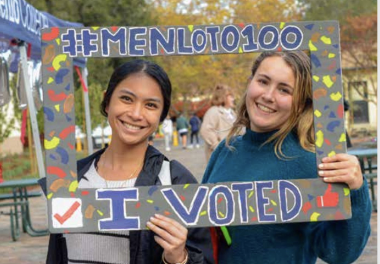
3 minute read
Political Change Propelled by Research
By Melissa R. Michelson, Ph.D., Dean of Arts & Sciences
Many people think of research as a purely academic pursuit, with only occasional application to the “real world.” They are wrong. Good research tells a culture the truth about itself, propelling positive change across political and social divides.
Politics is about power and individual rights, about how resources are distributed. Good political science research is vital to democracy, helping us better understand how power is acquired and exercised. My own research is dedicated to ensuring that members of historically marginalized groups have their share of that power and resources, and that their individual rights are recognized and protected. Campaigns and nonprofit organizations still use my 2012 book Mobilizing Inclusion: Transforming the Electorate through GetOut-the-Vote Campaigns (cowritten with Dr. Lisa García Bedolla) to help them turn low-propensity voters into habitual voters. Dr. Brian Harrison and I conducted research for our 2017 book Transforming Prejudice: Identity, Fear, and Transgender Rights by collaborating with organizations who used our work to expand support for the LGBTQ community.
I’ve collaborated with student researchers throughout my career at Menlo, most recently working with students to learn how best to motivate student participation in elections. I’ve had students collect data in the field, asking passers-by to fill out surveys, making survey phone calls to registered voters, and calling various state offices. In 2015 a crew of students worked with me to evaluate the San Mateo County vote-by-mail pilot, in a research project funded by the County and then used as evidence in Sacramento to support the Voters Choice Act.
Students learn that research is difficult and messy. It’s one thing to look at a survey and evaluate the findings, but another to work in the field making phone calls for multiple hours. In the current study I’m working on, Diana Guardado ’23 wrote the first draft of a grant we were awarded and she’s taking the lead, with Angielyn Dela Cruz ’24, in implementing the action plan we wrote. They have to think about scheduling, coordinating a team, budgeting—all sorts of valuable skills.
I’ve learned from students as well. They bring a fresh perspective to the research questions I’m trying to answer, offering new social media and internet tools and trends, or insights into how people think and act in the political arena. I love seeing students get excited about the work—when it becomes not just a job that I’m paying them to do but when they’re curious to help discover the answer to the research question we’re exploring. They become people who don’t just consume knowledge, the classic empty vessels into which educational material is poured, but people who are actively creating knowledge.
Even in a midterm election year, when enthusiasm is predictably lower than for a presidential contest, the Menlo College community was invested in the democratic process. In the months leading up to the election, nationally-recognized voter mobilization expert Dr. Melissa Michelson received a $250,000 grant from New Venture’s Campus Democracy Fund to evaluate ways to promote college student engagement in our democratic process, and yet more funding to specifically support voter participation right here at Menlo College. As these photos indicate, efforts to engage the Menlo campus community paid off—and national organizations took note. After the November 2022 election, Menlo College was recognized by the ALL IN Campus Democracy Challenge as one of the most engaged campuses for college student voting—a designation extended to fewer than 400 colleges and universities in the country this year!










